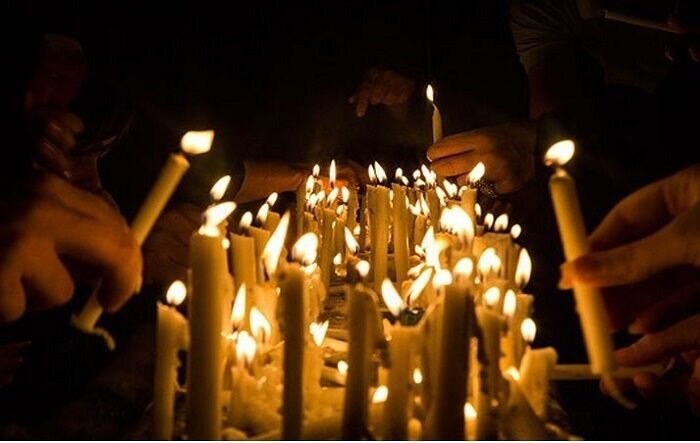Candle and Lamp Ceremony in Shahroud Tekiyehs during Muharram

Tekiyehs (prayer halls) of Bazaar, Golshan, Qaleh, Shariat, and especially Tekiyeh of Bid Abad, which is one of the old Tekiyehs of Shahroud, hold this traditional ceremony with special ceremonies. In this ritual, which begins minutes after sunset, the servants of these Tekiyehs, known as "watchmen", stand in a row in front of the Saqqakhaneh (A small indent in the wall overlooking some passages where water was poured for people to drink and had a kind of religious sanctity), which is called the lampstand. It is also common to play the trumpet to inform local servants during candle and lamp ceremonies. The custodian of the mosque and the elders also stand in front of the lighthouse, and the servants, who are on duty, line up in front of them.
To start the ceremony, someone in charge of the lights brings candlesticks and lanterns from the lampstand and arranges them on the floor in such a way that the candlesticks and lamps are arranged alternate. The lamp-holder then takes the candlestick from the row of lamps and candlesticks and recites the following poems and prayers aloud:
1st verse: It was night and the torch of Mohammadi religion was lit / the horizons became a flower garden because of his step
2nd verse: send the first blessings (Salawat) for the Prophet of Islam Muhammad in Medina/ send the second blessings for the Lion of God, Imam Ali in Najaf
3rd verse: third, curse the accursed Shemr (the killer of Imam Hussein) in Karbala / fourth, send blessings to Imam Reza in Tus
“Then the servants of Tekiyeh send prayers (Salawat) in harmony”
In front of the Saqqakhaneh, the sermon reader recites a special sermon on candles and lamps in such a way that it contains literary themes about the Prophet of Islam, Imam Ali, his wife Holiness Fatima, Imam Hassan, Imam Hussein and his descendants and seventy-two the martyrs of Karbala desert such as Hazrat Abul-Fazl Al-Abbas, Qasim Ibn Al-Hassan, Moslem Ibn Aqeel, Hani Ibn Orwa, Habib Ibn Mazahir, Moslim Ibn Awsajeh, Al-Hurr Al-Riyahi, Holiness Zainab, Hazrat Umm Al-Kulthum, Hazrat Sakineh and Hazrat Roqayyeh and finally, the sermon reader says Fatiha (reciting some verses from Quran) and then the servants of Tekiyeh bow.
The sermon reader prays for each of the following themes, and the servants say “Amen” after hearing each phrase:
For the longevity of the government
In order to accept the obedience and worship of honorable scholars
The needs of the needy
Healing the sick
Lending to borrowers
Rescue of Muslim captives
Security, welfare and cheapness of Iran
For the health of passengers
And the elderly
And officials
In order to accept the services of the officials of this ceremony
Coffee makers of this ceremony
For the praises of the family of the Prophet of Islam
Those who hit their chests to mourn Muharram
For the forgiveness of the parents present
And those who are absent from the ceremony
And for the devotees
After the sermon reader, Chavosh Khan (the singer of poems in praise of the Imams suitable for the pilgrimage to the holy shrines) recites poems by Mohtasham Kashani related to the Karbala tragedy in a melodious voice and at the end of each hemistich, the servants say prayers (Salawat).
At the end of the candle and lamp ceremony, the people who are on duty kiss the candles and lights and give them to their servant next. In the same way, candlesticks and lights are pilgrimage by all the servants and then handed over to reach the original place. In this way, the service of the previous guard ends and it is the turn of the next guard. In addition to being called the "candle and lamp" ceremony, it is sometimes called the "servants' evening" ceremony. In the end, it is noted that the occupations of sermon reading, the responsibility of the ceremony of candles and lights, and chanting (Chavosh Khani) in Tekiyeh of Bidabad are inherited. For example, the ancestors of the present sermon readers fathers are mentioned who recited sermons during the first decade of Muharram during their lifetime:
Hajj Zayn al-Abedin Ibrahimian the current sermon reader is the son of Karbala'i Haji Mohammad, Karbala'i Haji Mohammad is the brother of Karbala'i Ahmad, Karbala'i Ahmad is the son of Sheikh Ibrahim, Sheikh Ibrahim is the son of Hajj Muhammad who was the son of Hajj Ibrahim. He also inherited the job of a sermon reader from his ancestors. (The author is a faculty member at the Islamic Azad University)
AFM/MG
Leave a Comment